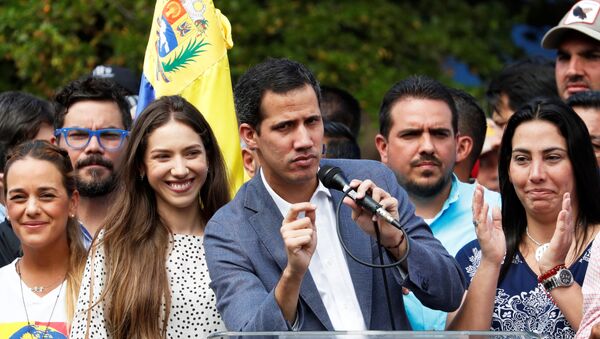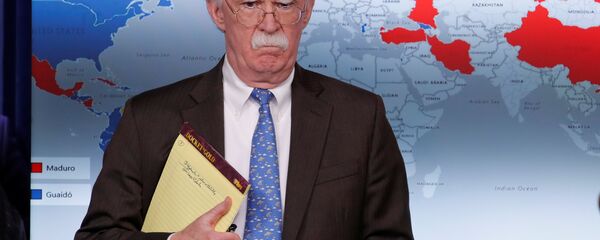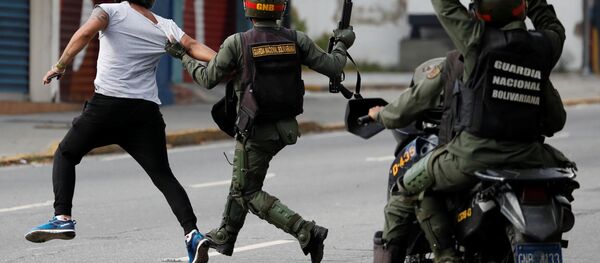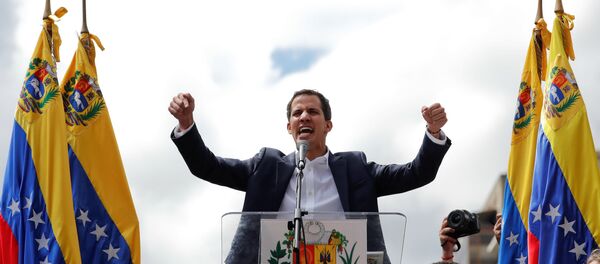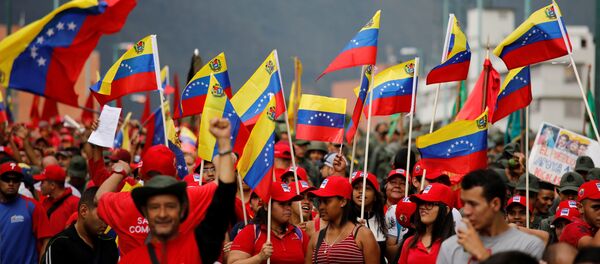Sputnik has discussed the issue with the Secretary of the 'Hands Off Venezuela' group, Jorge Martin, who also attended the rally in London.
Sputnik: What do you think of the new self-proclaimed Venezuelan president, Juan Guaido?
Jorge Martin: First of all, we have to say that Juan Guaido is not the president of Venezuela. He appointed himself at a street rally; and as I said yesterday at the protest in London, I can stand in a street protest and proclaim myself the Queen of England, but that doesn't make me the Queen of England or the head of State of the UK.
His appointment by himself, which was then recognised by [US President Donald] Trump, [Brazilian President Jair] Bolsonaro and others, has no legal standing in the Venezuelan constitution whatsoever — particularly not in Article 233, which they like to quote. So he has no legitimacy, he has no legal standing, and should not be recognised
Jorge Martin: What we're seeing here is a completely scandalous foreign interference in the internal affairs of Venezuela, under the guise of these countries — the United States, the European Union, and others — being worried allegedly about the humanitarian crisis in Venezuela.
But in fact, if you realise, yesterday, the US government decided to seize assets from PDVSA in the United States for 7 billion dollars. Surely, if this assets were in the hands of the Venezuelan government, the Venezuelan government would have been able to buy food and medications, which they certainly need to alleviate the situation in Venezuela.
The UK government (under the instructions of the United States) is withholding gold — which is in the Bank of England but belongs to Venezuela, and is worth 1.2 billion dollars — and is refusing to hand it back to its legitimate owner. Surely that money could have been used to alleviate the situation in Venezuela, which is certainly very, very dire.
Jorge Martin: Actually this is just a hypocritical cover for what is a coup, an attempted coup, the attempt to remove a government in a country, because the United States doesn't like this government.
But, in fact, it's down to the Venezuelan people to decide who should be their president, and they should be able to do so without any foreign interference.
Sputnik: Would you say that do European and western powers generally have double standards when it comes to adhering to international law and recognising the authority and legitimacy of democracies?
Jorge Martin: If today the Russian government wants to say that Trump is an illegitimate president, and that someone else — [US Democratic Speaker of the House] Nancy Pelosi or [Former US Presidential candidate] Hillary Clinton or [US Senator] Bernie Sanders — is the legitimate president of the United States, there will be a massive hue, cry and foreign interference as we've seen over the last few months.
But now the United States abrogated itself the right to decide who is the president of another country; this has a name and it's 'imperialist intervention,' and we are fundamentally opposed. And as for the leaders of the European Union giving Venezuela an eight-day deadline to call new elections, that's also completely scandalous.
For instance, Pedro Sanchez, the Prime Minister of Spain, has said that he's giving this deadline to Maduro to call elections within eight days or they will recognise Guaido go [as president].
Sputnik: But why do the US and Europe behave this way?
Jorge Martin: Because the European Union is not ruled by principles of democracy, human rights or humanitarian concerns. It is ruled by the big capitalists: the big companies, the bankers in each of these countries, and particularly German capitalists dominate the European Union.
What matters to them is their interests, profits and sources of raw materials and energy, which are mostly situated in other countries that they exercise an imperialist relationship with. Venezuela is as an oil-rich country, it has the largest oil reserves of the world, and it's also rich in many other things: gold, gas, and many other things. So it's interesting for EU imperialist companies to get their hands on these resources.
Sputnik: Are there also other reasons why European countries are taking this approach to the Venezuelan crisis?
So that's the kind of relationship that exists, particularly in the case of the UK, but also for the rest of the European Union countries — which sometimes strike a slightly independent statement, but in most of the major important things, they follow what the United States says.
Sputnik: So is it fair to say that in such cases, profit and business perspectives do indeed step over international law and democracy?
Jorge Martin: International law is actually a farce, because we see all the time, for instance with the United Nations, when a resolution is passed that goes against the interest of the United States (like, for instance, in relation to the embargo on Cuba, in relation to the Israeli invasion of the Occupied Territories), these resolutions are completely ignored. They are put in a drawer and forgotten.
And they have been passed. Every year, for four decades, when the resolution is passed, and goes in favour of the interest of the United Nations, then they use the United Nations as a fig leaf, as a cover for their real aims.
Sputnik: As for Juan Guaido’s appeal to European countries, which nations are most likely to hand the self-proclaimed president their support to rebuild his country?
Jorge Martin: I think there is a group of countries that have already decided. These are the ones that came out on Saturday, very clearly, in giving this deadline; these are Spain, France, Germany and the United Kingdom.
The common position that the European Union has now is already quite bad, because they are not recognising the legitimacy of the elections, where Maduro was elected in May last year.
That's already a very bad position. But within the allocated time, by this Saturday or next Monday, it will have a position of recognising a completely illegitimate president in Venezuela.
Sputnik: What EU countries will not answer Guaido’s call?
Jorge Martin: I don't know. I don't have any indication that other countries will resist this call. But there was some rumour, yesterday, in some newspapers in Uruguay that said that Federica Mogherini, the EU spokesperson, had said that there was a resistance to this idea of recognising Guaido.
I don't know whether this should be believed or not. What I'm certain about is that, at the end of the day, these major countries that dominate the European Union will carry the day, and they will decide the policy.
Jorge Martin: I think this is a major development in this crisis, because what they're attempting to do now is to eventually strangle the Venezuelan economy, with the aim of either forcing Maduro to resign or to call new elections, or forcing the specifically the army — as [US National Security Adviser John] Bolton mentioned — to intervene in politics, and remove Maduro.
So I think we are at a very crucial juncture in this crisis, which basically is an attempt by the United States to remove the democratically-elected government of Venezuela.
Views and opinions expressed in this article are those of Jorge Martin and do not necessarily reflect those of Sputnik.
